 A year ago this past Saturday, on October 1st, 2010, the world lost a wonderful person. A mother. A wife. A friend. A daughter. A passionate person dedicated to fighting for inmates on death row in Texas. How did we lose her?
A year ago this past Saturday, on October 1st, 2010, the world lost a wonderful person. A mother. A wife. A friend. A daughter. A passionate person dedicated to fighting for inmates on death row in Texas. How did we lose her?
Her best friend, Jennifer, writes:
“A year ago today, Kristi died after nearly five months of torturous depression. She was seeking treatment and had a strong support system, but depression is not always cured by popping a Prozac. It’s often a long experiment to see which drugs have an effect on your body while trying to be convinced that the thoughts coming from your mind are not your own.”
Depression is not always cured by popping a Prozac. Kristi had a support system too. Depression can kill. It’s not a term to be used lightly as Jennifer points out later in her deeply emotional post. It’s not something we get when it’s raining. Or when our favorite team loses. Or a candidate we’ve been pulling for loses the election. It’s not when a sports season is over. It’s not when Starbucks isn’t carrying Pumpkin Spice Lattes anymore. Depression isn’t some term to be bandied about in jovial conversation. We aren’t depressed because our grocery store was all out of our favourite kind of chocolate. That’s not depression. That’s disappointment. It may feel intense and you may be upset but it’s not depression.
Depression lingers. For weeks. For months. For some, for years. It hangs over you like a cruel fog, blocking everything and everyone from you. You reach out but all you see is the mist. You don’t see the family and friends desperately reaching toward you. You don’t see the doctors. You don’t see the world beyond what’s inside your head. You feel trapped. Hopeless. Lost. You panic. The fog gets darker and thicker. Eventually you break down. Can’t function like you used to – it’s like trying to walk through a pool of molasses. You know you can do it but the energy to push forward just isn’t there.
Some of us are fortunate to survive. Others are not. Those who don’t survive leave behind friends and loved ones filled with guilt, confusion, struggling to wonder if they could have done more. Thing is, we can only do as much as those who are suffering will let us. We can do everything right – get them to the doctor, help with therapy appointments, chores, childcare, medication, we can cross every T, dot every i, mind our p’s and our q’s, and some will still slip away from our fingers regardless of how tightly onto them we hold. Guilt, confusion, and wondering if we could have done more is a natural reaction to losing someone to suicide. It doesn’t mean there’s something wrong with you. It means you’re grieving a loss you don’t understand. A loss you blame yourself for… know this though, the blame is not yours to hold. It’s okay to let go of the blame too. Letting go of the blame doesn’t mean you’re letting go of the person. It means you’re not blaming yourself for their disappearance. They will always live on in your heart and through your actions.
This is where I really love Jennifer’s post. She’s walking in an Out of the Darkness walk for American Foundation for Suicide Prevention. She wants to help increase awareness. To make it okay to talk about suicide. So, in her own words:
I’ve found somewhere to start that works for me: Raising money for the American Foundation for Suicide Prevention. I’m going to walk one of their Out of the Darkness walks, because I’m committed to making suicide an acceptable topic of conversation. I’m going to help them raise money for education and awareness. And slowly, as I put the pieces back together, I’ll see what I can do to raise awareness for postpartum depression. Because no one should feel that desperate. No one should see suicide as their only way out. And because babies deserve mothers and mothers deserve help.
Once you’re there, I hope you’ll consider donating to her walking team for AFSP. They’re a terrific organization dedicated to raising awareness and increasing research and education regarding suicide. They support people struggling with suicide as well as educate their loved ones on how to help and how to cope after a loss. I hope you’ll support Jennifer as she strives to continue to make a difference in the world. Show her some love while you’re over there too. She could use it. I remember supporting Jennifer last year right after she lost Kristi. I remember the pain she felt – the pain she could barely express at the time. Over the past year, she’s struggled. She still mourns for Kristi. But Jennifer? You’ve come so very far. You’re doing something I know Kristi would be so very proud of you for doing. I know she’ll be there with you, walking with you. I know we’ve never met but I’m proud of you. Keep moving forward. Through the easy and through the hard. You’re not alone. You’ve got us right there with you and I know you’ve got Kristi too. You are loved. You, my dear, are awesome.









